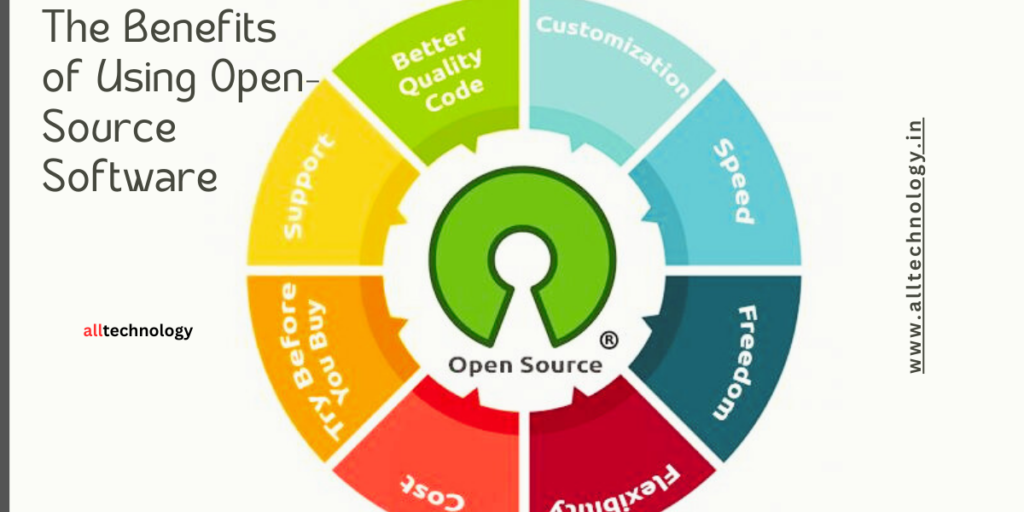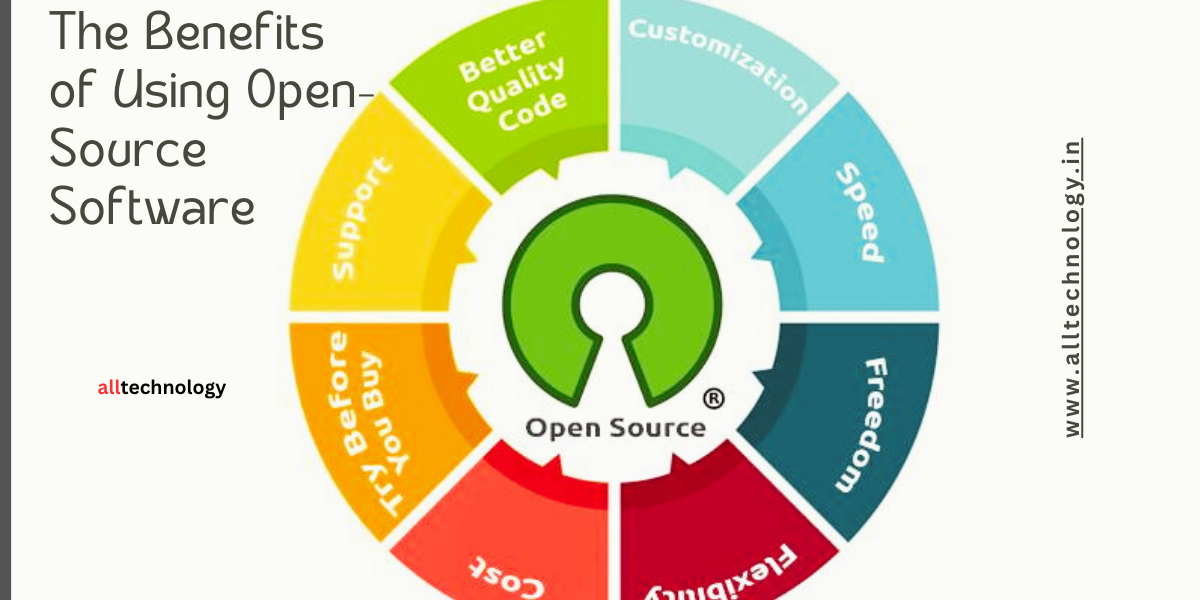Introduction
Hello Bloggers welcome alltechnology blog. In this blog you will learn The Benefits of Using Open-Source Software. In today’s rapidly evolving technological landscape, the debate between proprietary software and open-source software has become increasingly relevant. Open-source software, with its unique development model, offers numerous advantages that make it an attractive option for individuals, businesses, and governments alike. Let’s delve into the multifaceted benefits of adopting open-source software.

The Benefits of Using Open-Source Software
In today’s fast-paced digital world, the decision to choose software can be pivotal for individuals and businesses alike. One particularly compelling option is open-source software, which offers a plethora of advantages. These benefits, ranging from cost savings to enhanced security, make open-source software a preferred choice for many. Let’s delve into the myriad of benefits that open-source software brings to the table.
Cost-Effectiveness
First and foremost, open-source software is often free to use. This can lead to significant cost savings, especially for startups and small businesses operating on tight budgets. The absence of licensing fees allows organizations to allocate resources to other critical areas, such as development and innovation. Moreover, with no vendor lock-in, businesses can avoid costly long-term contracts and enjoy greater flexibility.
Enhanced Security and Transparency
When it comes to security, open-source software stands out. The transparency of its code allows for continuous scrutiny by a global community of developers and security experts. This collective effort helps identify and rectify vulnerabilities swiftly, ensuring that the software remains secure and reliable. Unlike proprietary software, where the code is hidden from public view, open-source software fosters an environment of trust and accountability.
Flexibility and Customization
The ability to modify and adapt open-source software to meet specific needs is another significant advantage. Users are not confined to the original design and functionality of the software; instead, they can tailor it to their unique requirements. This flexibility is particularly beneficial for businesses with specialized needs, enabling them to create customized solutions without relying on external vendors.
Community Support and Collaboration
Open-source software thrives on community support. A vibrant, engaged community often surrounds popular open-source projects, offering forums, documentation, and real-time assistance. This collaborative ecosystem fosters innovation and problem-solving, providing users with a rich resource of knowledge and expertise. The collective intelligence of the community can lead to faster development cycles and more robust software solutions.
Longevity and Sustainability
Proprietary software can be subject to the whims of its developers or parent company, sometimes leading to abrupt discontinuation. In contrast, open-source software is less likely to be abandoned. Its codebase is available for anyone to maintain and improve, ensuring longevity and sustainability. This durability makes open-source software a dependable choice for long-term projects.
Performance and Quality
The performance of open-source software is often on par with, if not superior to, its proprietary counterparts. The collaborative nature of open-source development allows for rigorous testing and quality assurance. Additionally, the diversity of contributors brings a wide range of perspectives and expertise, often resulting in innovative features and high-quality software.
Ethical and Philosophical Considerations
For many, the decision to use open-source software is also driven by ethical and philosophical considerations. The principles of open-source software—transparency, collaboration, and freedom—resonate with those who value digital rights and the democratization of technology. Using open-source software supports the idea of shared knowledge and collective advancement.
Cost Efficiency
One of the most compelling advantages of open-source software is its cost efficiency. Unlike proprietary software, which often comes with hefty licensing fees, open-source software is typically available at no cost. This affordability extends beyond initial acquisition; it also encompasses upgrades and maintenance, which are often managed by a global community of developers.
Imagine a small business with a tight budget. Instead of allocating a significant portion of their funds to expensive software licenses, they can invest in other crucial areas like marketing or research and development. Over time, the savings accumulated from using open-source software can be substantial, contributing to overall financial health and stability.
Customizability and Flexibility
Open-source software shines in its ability to be customized. Because the source code is accessible, users can tweak, modify, and enhance the software to meet their specific needs. This is particularly advantageous for organizations with unique operational requirements.
Consider a company in a niche industry that requires specialized software functionality. With open-source software, they can tailor the application to fit their precise specifications. This level of flexibility is often unattainable with proprietary software, which is usually designed to serve a broader audience and comes with restrictions on modifications.
Enhanced Security
Security is a paramount concern in the digital age, and open-source software offers significant advantages in this arena. With proprietary software, the source code is hidden, which can obscure vulnerabilities. Open-source software, on the other hand, benefits from transparency. Its code is continually reviewed and tested by a global community of developers, leading to rapid identification and resolution of security flaws.
This collaborative approach to security means that open-source software often undergoes more rigorous scrutiny than its proprietary counterparts. The diverse perspectives and expertise of the global community help ensure that vulnerabilities are swiftly addressed, providing a robust and secure solution.
Community Support and Collaboration
The community-driven nature of open-source software fosters an environment of collaboration and support. Users and developers across the globe contribute to forums, documentation, and development projects, creating a rich repository of knowledge and resources.
For example, if an individual encounters an issue with an open-source application, they can turn to community forums where experienced users and developers offer assistance. This collaborative spirit not only helps in problem-solving but also accelerates the pace of innovation, as new features and improvements are constantly being proposed and implemented.
Longevity and Sustainability
Open-source software often enjoys greater longevity and sustainability compared to proprietary software. With proprietary solutions, the future of the software is tied to the fortunes of the company that develops it. If the company goes out of business or discontinues the product, users can be left in a lurch.
In contrast, open-source software, supported by a decentralized community, is not dependent on a single entity for its survival. Even if the original developers move on, others can pick up the mantle and continue development. This ensures that the software remains viable and up-to-date, safeguarding the investments of its users.
conclusion
The benefits of open-source software are multifaceted and compelling. From cost efficiency and customizability to enhanced security, community support, and sustainability, open-source software presents a powerful alternative to proprietary solutions. As technology continues to advance, the principles of openness and collaboration that underpin open-source software will likely become even more integral to the digital landscape. By embracing open-source software, individuals and organizations can harness these advantages to drive innovation, efficiency, and growth.
FAQ
Question 1. What are the benefits of open-source software?
Open source enables technology agility, typically offering multiple ways to solve problems. Open source helps keep your IT organization from getting blocked because a particular capability isn’t available from a vendor.
Question 2. What are the advantages of open source software?
Advantages. Open source implementation of a standard can increase adoption of that standard. This creates developer loyalty as developers feel empowered and have a sense of ownership of the end product.
